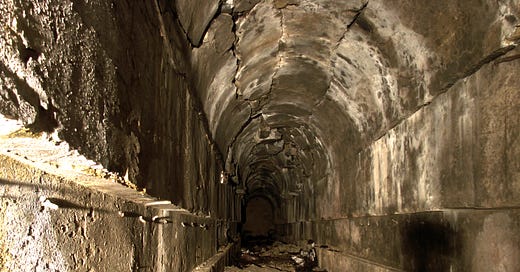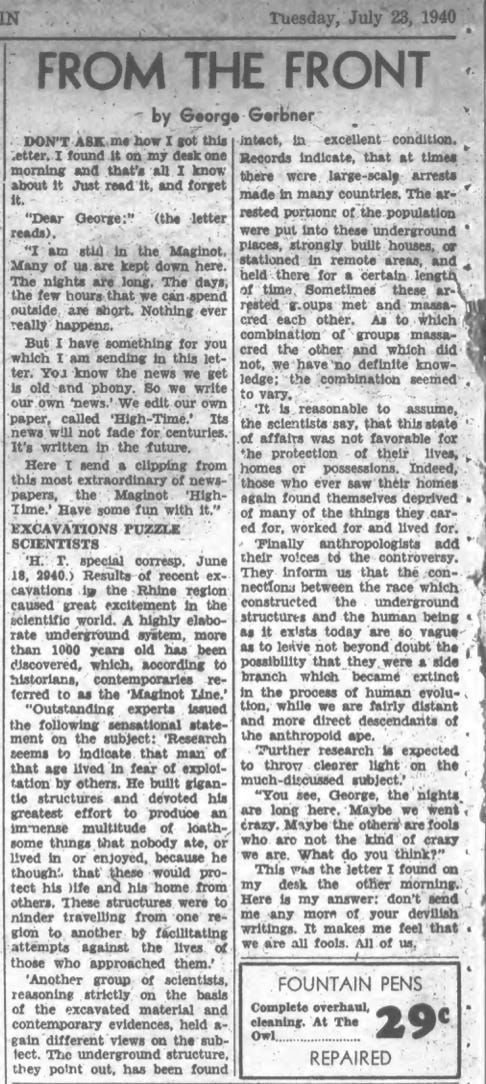In May 1940, German forces invaded France, sidestepping the heavily fortified Maginot Line and taking the Allied forces by surprise. By June 14, 1940, Nazi forces had entered Paris.
The following week, on June 23, 1940, my grandfather published a remarkable — and strange — article in the UCLA Daily Bruin entitled “From the Front.” It was not a news report. It was closer to science fiction.
“Don’t ask me how I got this letter,” the article begins. “I found it on my desk one morning and that’s all I know. Just read it, and forget it.”
The following “letter” is written by someone who was “still in the Maginot” — the complex network of fortified tunnels that had formed the core of the (failed) French defense plan against Nazi Germany.
“You know the news we get is old and phony,” writes the unnamed person in the Maginot. “So we write our own ‘news.’ We edit our own paper, called ‘High-Time.’ Its news will not fade for centuries. It is written from the future.”
What?!
I did not expect this. I’m sure my grandfather had a complex emotional and intellectual response to the Nazi invasion of western Europe, but this one comes as a real surprise. Instead of making a polical statement or an analysis of current events, he turns to science fiction: he imagines what the Maginot line will mean 1000 years in the future, in the year 2940.
“EXCAVATIONS PUZZLE SCIENTISTS” reads the headline in the Maginot High-Time newspaper.
According to the article, future scientists were debating the meaning of the “highly elaborate underground system” known as the “Maginot Line.”
Some researchers theorized that “man of that age [i.e. 1940] lived in fear of exploitation by others. He built gigantic structures and devoted his greatest effort to produce an immense multitude of loathsome things that nobody ate, or lived in or enjoyed, because he thought that these would protect his life and his home from others.”
Another groups of scientists, “reasoning strictly on the basis of the excavated material and contemporary evidences,” held a somewhat different point of view: According to records, there were “large-scale arrests made in many countries,” and prisoners were “put into these underground places, strongly built houses, or stationed in remote areas.” At various points, “arrested groups met and massacred each other.” Yet the meaning behind all of this horror has been lost: “As to which combination of groups massacred the other and which did not, we have no definite knowledge.”
Anthropologists also weighed in on the debate: they “inform us that the connection between the race which constructed the underground structures” and the humans living in 2940 is “so vague as to leave not beyond doubt the possibility that they were a side brand which became excinct in the process of human evolution.”
Wow.
There is a lot to parse here. And there’s also a lot of dark humor. “You see, George,” the letter writer concludes, “the nights are long here. Maybe we went crazy. Maybe the others are fools who are not the kind of crazy we are. What do you think?”
“Here is my answer,” my grandfather concludes: “don’t send me any more of your devilish writings. It makes me feel that we are all fools. All of us.”
We are all fools. All of us.
I have been trying to wrap my head around this article for the past few days. My analysis goes in a few different directions.
On one hand, the article is a political commentary about the futility of war and warlike mentalities. Instead of creating beautiful things or spending time with loved ones, people of “that age” lived “in fear of exploitation,” and chose, instead, to “devote [the] greatest effort to produce an immense multitiude of loathsome things that nobody ate, or lived in or enjoyed.” It is a sad reality, and an avoidable one.
The perspective from the year 2940 makes the mass murder of the war years seem absurd: “As to which combination of groups massacred the other and which did not, we have no definite knowledge,” states the article from the future. The implicit argument is: why are people killing each other? What causes one group to murder another group?
The anthropological perspective adds both explanation and a vexing question: did the “race which constructed the underground structures” survive the subsequent years? Or did they engage in such terrible warfare that they did not survive to 2940? The mention of “race” also brings to mind Nazi racial theories — and racist theories in general — which were the ideological justification for so much mass murder and destruction.
There is no happy conclusion here. Nor is there really any conclusion, except absurdity, insanity, futility, and humor.
I keep coming back to the last line:
We are all fools. All of us.
***
Nuts to crack:
I’ve been trying to understand my grandfather’s stance on the war in 1940. I think he was anti-war, as far as I can tell. He was certainly anti-Nazi also, and anti-fascist, but he did not seem to embrace war as the answer — at least not at this moment. That would change in subsequent years.
How unusual was his reaction/approach to the Nazi invasion of France?






Wow! And welcome back to St. Paul.